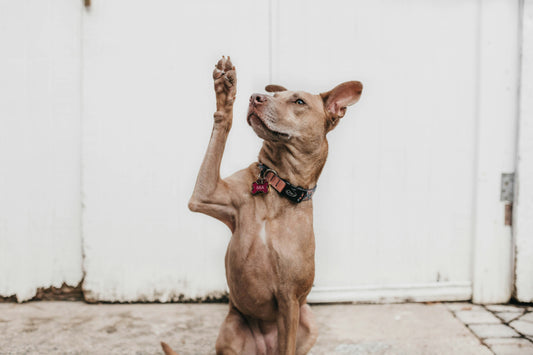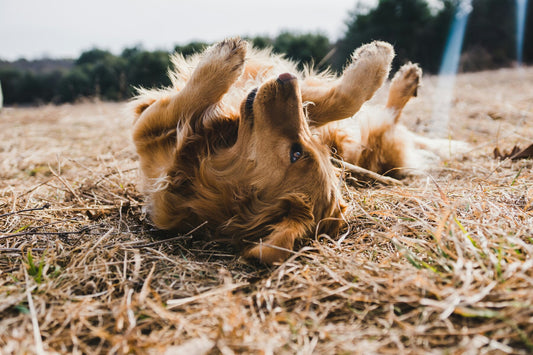Understanding and Treating Dog Scooting: A Comprehensive Guide

Have you ever seen your dog scooting across the floor and wondered what’s going on? This behavior can be both amusing and concerning. While it might just seem like a quirky habit, it can sometimes signal underlying health issues. In this article we’ll explore everything you need to know about dog scooting, from causes to treatments, helping you ensure your furry friend’s health and happiness.
What is Dog Scooting?
Dog scooting is a behavior where a dog drags its bottom across the ground. This action, while sometimes a normal part of a dog’s behavior, can indicate discomfort or health issues in the anal area.
Understanding what dog scooting is and why it happens is crucial for pet owners. It’s not just a funny quirk; it can be a sign that your dog is trying to relieve irritation, discomfort, or even pain. Recognizing this behavior as a potential health indicator is the first step in ensuring your dog’s well-being and comfort.
Common Causes of Dog Scooting
Understanding the reasons behind your dog’s scooting behavior is essential in addressing the issue effectively. Here are some of the most common causes:
- Anal Gland Issues: Your dog’s anal glands can sometimes become impacted or infected, leading to discomfort. Anal sac issues are the most frequent reasons why dogs scoot. The glands, located on either side of your dog’s anus, secrete a fluid that helps mark territory. When these glands are not emptied naturally, they can cause significant discomfort, prompting your dog to scoot in an attempt to relieve the pressure.
- Parasites: Parasitic infections, especially those involving worms like tapeworms, can cause irritation around the dog’s anus. This irritation can lead to butt scooting as your dog tries to soothe the itchiness. Regular deworming and fecal exams are important to prevent and detect these parasites.
- Allergies: Allergic reactions, whether to food, environmental factors, or flea bites, can cause skin irritation and inflammation around the anus. This can lead to scooting as your dog attempts to alleviate the discomfort.
- Irritation from Stool: Sometimes, remnants of stool stuck in or around the dog’s anus can cause irritation, leading to scooting. This is more common in dogs with longer fur or those with digestive issues that may lead to softer stools.
- Other Health Issues: Less commonly, scooting can be a sign of other health problems, such as tumors or infections in the anal area, or even neurological issues that affect the tail or hindquarters.
Recognizing the Signs of a Problem
While dog scooting can sometimes be a normal behavior, there are certain signs that indicate it might be a symptom of a more serious issue. As a responsible pet owner, it’s important to recognize these signs to ensure your dog’s health and comfort.
- Frequency and Intensity: Occasional scooting might not be a cause for concern, but if you notice your dog scooting frequently or with apparent urgency, it could indicate an underlying problem. Persistent scooting, especially if accompanied by signs of distress, requires attention.
- Physical Signs Around the Anus: Look for redness, swelling, or discharge around your dog’s anus. These can be signs of infection or impaction of the anal sacs. Also, check for any signs of parasites, like small, rice-like segments around the anus or in your dog’s stool, which could indicate a tapeworm infection.
- Changes in Bowel Movements: Monitor your dog’s stool for any changes in consistency, color, or frequency. Diarrhea or unusually soft stools can cause irritation around the anus, leading to scooting. Conversely, constipation can also lead to discomfort and scooting.
- Other Behavioral Changes: If your dog seems more withdrawn, irritable, or has a decreased appetite along with scooting, these could be signs of discomfort or pain. Changes in general behavior should always be noted and considered in the context of physical symptoms.
- Odor or Blood: A foul odor or the presence of blood near the dog’s anus or in its stool is a red flag. These symptoms can indicate infections or more serious conditions that require immediate veterinary attention.
Home Remedies for Dog Scooting
Dealing with your dog’s scooting behavior can often be managed with some simple home remedies. These methods can provide relief and are a good first step before seeking veterinary assistance, especially for mild cases.
- Anal Gland Expression: One of the most common reasons for scooting is impacted anal glands. Learning how to safely express these glands at home can provide immediate relief. However, it’s important to get proper guidance from a vet or a professional groomer first to avoid causing harm.
- Dietary Fiber: Increasing the fiber content in your dog’s diet can help create bulkier stools, which can naturally express the anal glands during defecation. Pumpkin and wheat bran are great natural sources of fiber that can be added to your dog’s meals.
- Warm Baths: Regular warm baths can soothe irritation and cleanse the area around the anus. This can be particularly helpful if your dog is scooting due to irritation or minor infections. Ensure to gently clean and dry the area thoroughly after the bath.
- Probiotics and Supplements: Adding probiotics to your dog’s diet can improve gut health and aid in digestion, potentially reducing scooting caused by digestive issues. Supplements that support anal gland health are also available and can be beneficial.
- Regular Grooming and Hygiene: Keeping the area around your dog’s anus clean and trimmed can prevent irritation and matting, which can lead to scooting. This is particularly important for long-haired breeds.
- Exercise: Regular exercise can help maintain a healthy digestive system. It encourages regular bowel movements, which can help naturally express the anal glands.
While these home remedies can be effective for mild cases of scooting, it’s crucial to monitor your dog’s condition. If the scooting persists or if you notice any signs of distress or illness, it’s important to consult with a veterinarian.
The Importance of Grooming in Preventing Scooting
Grooming is crucial in preventing scooting in dogs. It’s not just about aesthetics; it’s essential for their health, especially around the anal glands. Proper grooming can significantly reduce scooting incidents.
Regular grooming keeps the area around the dog’s anus clean, particularly vital for long-haired breeds. Trimming fur around this area prevents fecal matter from causing irritation and scooting. Additionally, grooming sessions allow for checking signs of swelling or infections near the anal area, enabling early treatment.
Bathing your dog with a mild, dog-friendly shampoo also helps. A gentle wash soothes irritated skin and removes debris that might cause discomfort. Remember, thorough rinsing and drying are key to avoid further irritation.
Lastly, regular checks and, if necessary, professional expression of the anal glands can prevent scooting, especially in smaller breeds.
Dietary Changes to Help with Scooting
Adjusting your dog’s diet can be crucial in addressing scooting. A balanced fiber intake is key; too little can lead to constipation and scooting, while too much might cause diarrhea and irritation.
Consider adding fiber-rich foods like pumpkin to regulate bowel movements. Also, ensure your dog stays hydrated, as proper hydration supports digestive health. Remember, gradual changes are best to avoid upsetting your dog’s stomach.
When to Seek Veterinary Help
It’s essential to know when home remedies aren’t enough and professional veterinary care is needed. If your dog’s scooting persists despite your efforts, or if you notice signs of distress, pain, or bleeding, it’s time to consult a vet. These symptoms could indicate more serious conditions like impacted anal glands, infections, or parasites.
A veterinarian can provide a thorough examination, diagnose the underlying issue, and recommend appropriate treatments. Early intervention can prevent complications and ensure your dog’s comfort and health.
Medical Solutions to Treat Dog Scooting
To treat dog scooting, veterinarians have several options at their disposal, depending on the underlying cause. If the issue is related to anal gland problems, a common solution is expressing or emptying these glands. This procedure, often straightforward, can provide immediate relief to your dog.
In cases where infections are the root cause, your vet may prescribe antibiotics or anti-inflammatory medications. For dogs suffering from parasites, appropriate deworming treatments will be necessary. It’s crucial for pet owners to understand that while these treatments are typically effective, they may need to be repeated or accompanied by other long-term management strategies to prevent recurrence.
The Role of Supplements in Managing Scooting
Supplements can play a vital role in managing and preventing dog scooting. They can enhance digestive health, ensuring smoother bowel movements and reducing strain on the anal glands. Probiotics, for instance, are beneficial in maintaining a healthy gut flora, which is crucial for digestion and stool consistency. Fiber supplements can also be helpful, as they add bulk to the stool, aiding in natural anal gland expression.
Omega-3 fatty acids, found in fish oil supplements, can reduce inflammation and help with any skin irritation around the dog’s anus. Additionally, supplements that support overall immune health can prevent infections that might lead to scooting.
Bando offers a range of supplements specifically designed to support digestive health and reduce the likelihood of scooting. These products are formulated with your dog’s health and comfort in mind, ensuring they receive the best care possible.
Conclusion
In this guide, we’ve explored the various aspects of understanding and treating dog scooting. From identifying the common causes to discussing home remedies and the importance of diet, we’ve covered essential information to help you manage this condition effectively.
Remember, Bando is your go-to source for high-quality care products and supplements. Our range of products is tailored to support your dog’s health, including those that aid in preventing and managing scooting.
Browse our catalog of supplements and care products for pets and contact our team for personalized assistance. With the right care and attention, you can ensure your furry friend stays happy, healthy, and scoot-free.






